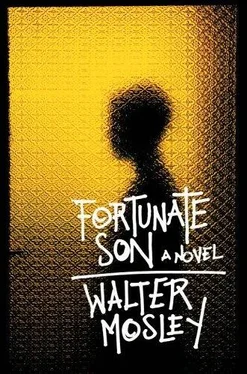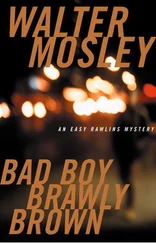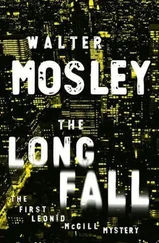And so he was surprised in the late summer when Christie came to his house crying.
They went out in the overgrown flower garden and sat on the marble bench there.
“What’s wrong?” Eric asked.
“I told Drew.”
“About us?”
“No. I told him that I wasn’t going to Yale with him.”
“Really? You’re not going to the East Coast?”
“No. I can’t leave you,” she said.
“But what are you going to do?”
“I’ll get a job at my father’s office and rent an apartment. Then we can spend more time together. I know you’re still in high school and you might not even want me, but I can’t go with Drew. I don’t love him. I haven’t since I saw you on the tennis court that day.”
Christie had on a small cranberry-colored dress. She stood up and took it off, revealing that she wore nothing underneath. It was four in the afternoon on a Friday. The sun was bright, and they were the only ones there. As they made love on the marble bench, Christie moaned and cried, dug her nails deep into Eric’s back, and begged him please, please, please.
“I’m yours,” she said at the door that evening, “if you want me.”
She drove off leaving Eric to think about the past semester. He wondered not about Christie but about Drew. The darkly handsome senior had everything before they tangled over Limon. Eric had borne no animosity toward the older boy. He hadn’t meant to take his girl away. On the school yard the boys had been civil. Drew appreciated Eric not making him apologize.
A week after his first night with Christie, she’d told him that Drew had seen a semen stain that Eric had made on the inside roof of the car.
“I told him that he made it, but you know his never shot out like yours does.”
Eric had felt embarrassed for Drew. He wasn’t competing. He just couldn’t say no to Christie’s surrender. He still couldn’t.
“Mine,” Eric said to himself, watching the red lights of Christie’s Honda recede down the street.
For three days six-year-old Thomas made his way to school using the abandoned alleyway. The gang of third-graders didn’t bother him anymore, and he loved the green, dewy wilderness of the walk. Going to school and coming home on the secret path were the highlights of his day.
But school itself was no better than on that first morning. The light in Mr. Meyers’s classroom still made him weep. He managed to keep everybody except Bruno from noticing. But the other children all thought that he was different, that he “talked like white people,” and that he was strange in other ways too.
Thomas had rarely watched television, not even very much with Eric. He never watched at all at his father’s house. He preferred looking at bugs and insects, and he fell a lot and lost his lunch money all the time and never completely understood what people were saying to him. And, worst of all, he seemed to have spells. On the playground at recess, he would sit by himself and close his eyes and talk even though there was nobody there.
“He talks to dead people,” Bruno said, sticking up for his friend.
But this only made the children more wary of the odd new “bug boy” that acted so weird.
The big boys picked on him, and the girls often screamed and ran if he came near. Mr. Meyers was bothered by the way he answered questions in class. The only good thing about school was Bruno and sometimes his sister, Monique, when she came to walk Bruno home after school.
Once in a while at lunchtime and recess, Bruno and Thomas would go to a far corner and talk about comic books. Bruno knew everything about the Fantastic Four. He studied them from old reprints and new comics that came out each month. At the library they had big hardback books that compiled the first issues released in the early sixties.
Bruno knew everything about them. Johnny Storm, the high-flying Human Torch; bashful Benjamin Grimm; Stretcho; and Suzie, the Invisible Woman. Every day he’d tell Thomas another story about their battles with Doctor Doom or the Mole Man. Bruno couldn’t read all the words, but his sister helped him sometimes. He told Thomas that in the old comics you didn’t need the words because the pictures told the story.
The worst thing about school was the sunlight in the first-grade classroom. He told Mr. Meyers that it hurt his eyes, but the teacher didn’t know what to do.
“We can’t put down the shades, Lucky,” he said. “Children need light.”
“You could get those green shades like the nurse has,” Thomas suggested.
“I’m lucky if I get a budget for pencils,” Meyers replied.
The sadness he experienced in that bright room became so unbearable that on Thursday Thomas “Lucky” Beerman made a decision.
“I’m not comin’ to school tomorrow,” he told Bruno.
“How come?”
“I’m not coming back anymore. I don’t like it here.”
“But where you gonna go?”
“Nowhere. Daddy goes to work every morning and doesn’t come back till late. He always goes out, and he doesn’t care ’bout what I’m doing.”
“But what if he stays home sometimes?”
“I’ll just go out in the back alley,” Thomas said. “I’ll stay back there.”
“Okay,” Bruno said as if the final decision was his. “An’ I’ll tell Mr. Meyers that your mother come and took you away. An’ if they send a letter to your house from the school, we could get Monique t’read it and then th’ow it away.”
The next morning Thomas went out the front door and then through the hole in the fence a few houses down. That’s where his journey both ended and began. He climbed around the broken chunks of concrete in the middle of the road directly behind his house, and then he went through the thick bushes that had grown up along the sides. The alley was lower than the yards that abutted it, and so it was always wet from people watering their gardens and lawns.
On the first day Thomas saw lizards and a garden snake, three mice, one rat, and a family of opossums living in the incinerator. He saw crows, redbirds, one soaring hawk, and a bright-green parrot that had escaped from some cage, no doubt. The parrot made his home in an oak tree half in and half out of Thomas’s little valley.
“No man,” the bird would say now and then. “No man.”
Thomas felt that the bird, which he called No Man, was announcing that this was their home and not a place for grown-ups.
The alley valley was overgrown with sapling trees and other vegetation. Thomas could stay under a roof of leaves that modulated the light and made him calm.
That first day he explored the length and width of his new home. It was a long block, twenty backyards on either side. At its widest it was twenty-eight boy-sized paces from one fence to the other. There was asphalt and concrete and dirt that made up the various terrains, mostly flowerless trees and bushes. There was a lot of trash too: bits of paper, crumbling cardboard pallets that the occasional homeless person had used to sleep on. There were soda and beer cans, plastics of all kinds, and even old machinery and chunks of metal that people had discarded over the years. But there were few other visitors that Thomas saw in those first few months. That was because it was hard for anyone much larger than Thomas to get back there. The stone wall of the church had a chink big enough for only the little boy to squeeze through, and the rest was fenced off from the private backyards of houses.
Many of these yards had dogs that barked and growled at Thomas, but he stayed out of their way and soon they got used to him.
It was his paradise. The only stable respite his childhood would know. He spent that first Friday laughing and thinking that maybe the name Lucky fit him.
Читать дальше












